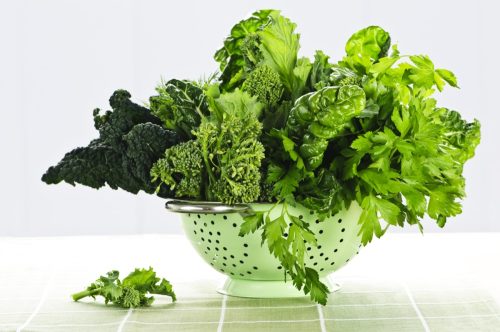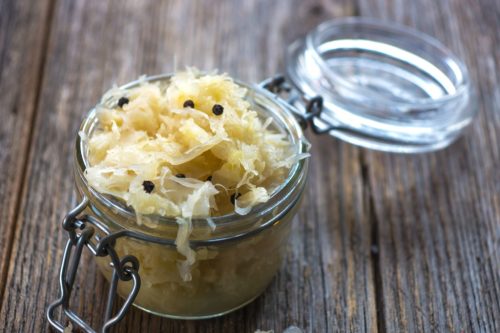The stark increase in dementia cases in recent years has many concerned about developing the condition, which already affects over 55 million people worldwide, according to Alzheimer’s Disease International. To make matters worse, that number is expected to double over the next two decades and reach 139 million cases by 2050. With that in mind, we are all looking for ways to decrease our risk of dementia and Alzheimer’s disease—the most common form of the condition. You may be happy to learn that a new study yielded promising results when it came to evaluating one vitamin’s potential to improve cognitive abilities. And it’s one you might already be consuming. Read on to find out which vitamin you’ll want to be sure you’re getting enough of to stave off cognitive decline.
RELATED: This Common Medication Could Be Hurting Your Brain, New Study Says.


Findings from a new study presented at the Experimental Biology meeting earlier this month suggest that vitamin K has the potential to improve cognitive abilities in aging brains. As reported by Medical News Today, researchers from AlMaarefa University in Saudi Arabia evaluated the protective effect of vitamin K by comparing two groups of older rats (which are often used in scientific research due to their genetic similarities to humans).
Vitamin K includes the compounds vitamin K1 and vitamin K2. In the study, one group of rats received a vitamin K2 supplement, menaquinone-7 (MK-7), while the second group did not. When undergoing cognitive functioning tests over the course of 17 months—including a maze, a swim test, and a “sociability test”—the rats that received vitamin K showed reduced levels of cognitive impairment, depression, and anxiety. In addition, investigators observed improvements in spatial memory and learning ability as a result of vitamin K supplementation.


Wondering how you can reap the benefits of vitamin K? Eating one to two servings of leafy greens such as spinach, kale, collard greens, and lettuce should get the job done for vitamin K1. Vitamin K2 is less common in Western diets, according to a 2021 study of the vitamin’s effect on Alzheimer’s disease, as it is mostly found in fermented foods, pickled vegetables, and some cheeses. Meats, fish, and egg yolks also have menaquinone-4 (MK-4), a form of vitamin K2 that is converted from vitamin K1.
You can also substitute these natural sources with supplements, senior author of the latest study Mohamed El-Sherbiny, PhD, professor of anatomy at AlMaarefa University, told Medical News Today. However, other studies differ on the protective benefit of these supplements, which don’t allow vitamin K to be absorbed as well in the body, the Alzheimer’s Organization states.
RELATED:
For more up-to-date information, sign up for our
daily newsletter.


Previous studies have shown the benefits of vitamin K and its ability to slow cognitive decline in the aging brain, including a 2018 study of 960 older adults published in Neurology. When individuals ate one to two servings of mustard greens, spinach, collards, or kale every day, they had the same cognitive abilities as those who were 11 years younger.
Curious how this works? Science shows that vitamin K reduces nerve cell death “by protecting nerves from harmful substances in the brain,” the Alzheimer’s Organization says. Beyond that, the gene connected to the development of Alzheimer’s disease also contributes to a “lower metabolic production of vitamin K in the individual,” the organization said, and vitamin K2 may have the potential to slow the progression of Alzheimer’s disease or contribute to prevention, the 2021 study found.
El-Sherbiny also commented on these protective effects, telling Medical News Today, “The aging process is associated with deterioration of brain functions. Vitamin K is a natural fat-soluble vitamin [that] protects the brain from the development of Alzheimer’s.”


While this study was not conducted in humans, researchers believe the results show promise. Findings lend more support to the vitamin K hypothesis, and according to El-Sherbiny, vitamin K levels should be monitored in older adults at risk for developing dementia, Alzheimer’s disease, and other neurodegenerative diseases related to age.
Vitamin K cannot stop the development of Alzheimer’s disease or dementia, the Alzheimer’s Organization says, but you might want to make some dietary changes to promote brain health. Jennifer Bramen, PhD, a senior research neuroscientist at Pacific Neuroscience Institute at Providence Saint John’s Health Center in Santa Monica, California, called attention to the need for more research on the subject. However, adding more healthy foods to your daily diet is never a bad idea. Fermented vegetables like sauerkraut can give you that dose of MK-7, as well as other known health benefits, Bramen told Medical News Today.
Fermented foods “are excellent for your gut microbiome, which has a well-established link to cognitive decline,” Bramen said. “I would recommend incorporating these into a diet designed to promote brain health and cognition.”
RELATED: Eating This Popular Food Can Lead to Dementia, Study Says.